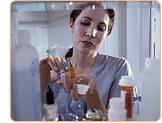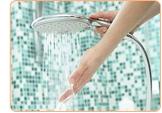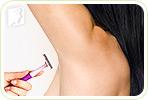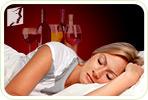Women who are going experiencing menopause are susceptible to many symptoms, including: hot flashes, night sweats, anxiety, and panic attacks. These symptoms can lead to more profuse sweating, which can lead to strong body odor. If you want to learn how to tackle this menopausal issue head-on, these are five important things you need to know.
Five Things to Know About Menopausal Night Sweats
Don't blame yourself. Blame your hypothalamus

It's this gland, located at the base of the brain, that is responsible for your changes. It controls your body temperature, and it's usually regulated by estrogen. However, since your estrogen levels have decreased, your hypothalamus has decided to wreak havoc on your body, causing you to sweat more profusely.
All sweat glands are NOT created equally

You actually have two types of sweat glands: eccrine and apocrine. Eccrine sweat glands are found all over the body and secrete a sweat that never develops an odor. Apocrine sweat glands, located in your armpits and groin area, release a sweat that contains fatty composites that bacteria consume when you sweat, which is responsible for the strong odor.
Some medicines actually make you sweat more

Research suggests that women taking medicine for hypoglycemia or breast cancer, or medicine prescribed to lower their body temperatures may experience hot flashes as a result of these medications. Some combinations of medication may cause hot flashes, as well. You should ask your doctor if you think your medicines are triggering hot flashes and making you sweat.
You should NOT take cold showers

Even though taking a cold shower seems like the logical solution for ending night sweats, it will only exacerbate the problem. While the cold water will bring temporary relief, returning to the warmer air once your shower ends will only trigger profuse sweating, leaving you worse off than you were before.
Alcohol is not your friend

While you are suffering from difficult menopause symptoms, such as mood swings, night sweats, and hot flashes, taking the edge off with a glass of wine seems like much-needed relief. However, drinking alcohol during menopause can make your symptoms worse. Alcohol odors secreted through the skin can mingle with your sweat and make your body odor worse. Other triggers include red meat, coffee, garlic, and cigarettes.
More Information about Night Sweats Treatments
If you are suffering from night sweats in the menopausal transition, it may be necessary to change your lifestyle to include more exercise and healthier food. Alternative and herbal medications can also be a solution. However, more serious treatments, like hormone replacement therapy, should only be taken under medical supervision and as a last resort. Click the following link to find out more about night sweats treatments.
Sources
- Boston Women's Health Collective. "Hot Flashes, Night Sweats and Sleep Disturbances." Our Bodies, Ourselves, 2006.
- The National Institute of Health.(n.d). "Signs of the Menopausal Transition." Retrieved from www.nih.gov.
- Von Muhlen, DG, et al. "A community-based study of menopause symptoms and estrogen replacement in older women." Maturitas. Sept 1995; 22(2):71-8.


